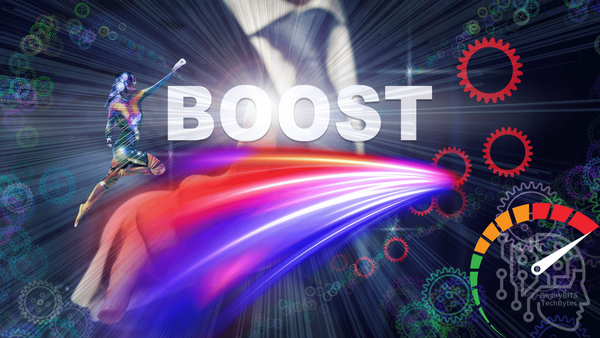What The Heck Is AI?

Welcome back! Today, we're going to talk about one of the most fascinating topics within the world of technology and probably, the most relevant question today: What is artificial intelligence? AI has exploded as of late but it has actually been around for quite some time. From its humble beginnings in the 1950's, to its current state-of-the-art achievements, AI has come a long way, but there's still so much more that AI will achieve!
AI has evolved over time. It has met, and continues to meet, many challenges but, it is faced with many more exciting possibilities that lie ahead. So, ready or not, buckle up and get ready for an adventure into the world of AI!
The Spark of AI
Initially, during the early stages of the development of AI, the main goal of researchers was to design machines that had the capability to imitate human intelligence. The renowned computer scientist and mathematician, Alan Turing, one of the pioneers in this field, made significant contributions to AI's growth. Turing's exceptional work during World War II, which involved cracking the German Enigma code, is well-known. However, his lasting legacy in AI is the creation of the Turing Test. This test is considered a hallmark in the assessment of machine intelligence as it evaluates a machine's ability to exhibit sophisticated and compelling human-like skills that are nearly impossible to differentiate from that of a human being.
During the infancy of AI, there were several pioneers in the field, including John McCarthy, a Stanford University Professor, Marvin Minsky, co-founder of the Massachusetts Institute of Technology's AI laboratory, and Claude Shannon, the "father of Information Theory". Their primary focus was on creating sophisticated algorithms and computer programs that could replicate human-like capabilities like reasoning, decision-making, and problem-solving. These initial endeavors were pivotal in establishing and advancing the field of AI, and formed the groundwork for the cutting-edge technologies that exist today.

The AI Slumber
AI was undeveloped during the mid - 1970's to the late 1990's, as it's interest declined significantly. This was due in part to the inability of early AI systems to live up to their promise, as well as, the severe lack of funding and support allocated for AI research. One of the main reasons for the decline of AI during this period was the failure of expert systems which, were designed to mimic the decision-making processes of human experts but, ultimately proved too limited in their capabilities. Additionally, the lack of computational power available through these years made it difficult to develop further advanced AI systems.
The Rise of Machine Learning
Over the past few years, there has been a considerable and noticeable upsurge of curiosity in the realm of artificial intelligence, especially as it concerns the subfield of machine learning. The rejuvenated enthusiasm can be primarily attributed to the tremendous growth of big data and the expanded access to top-of-the-line cloud computing resources, which have amplified the potential for development in this area. The advancement in obtaining now massive computing power, brought AI capabilities to an unprecedented level.
Due to the availability of large datasets and the necessary computational power for their analysis, researchers have made remarkable progress in creating algorithms that can learn from this data. These algorithms have the capability to make predictions or important decisions based on the extracted insights. This breakthrough technology, known as machine learning, has endless possibilities, from enabling autonomous vehicles to providing personalized medical care.
AI in Everyday Life
AI-powered virtual assistants such as Siri and Alexa have been developed to assist individuals with a myriad of tasks, from setting reminders to purchasing groceries, just by interpreting voice commands. Self-driving automobiles rely heavily on AI to facilitate transportation and exercise decision-making capabilities to navigate roads in a safe and responsible manner. The utilization of AI in online shopping platforms allow for a more tailored, personalized, and efficient consumer experience through suggesting products based on individual browsing and purchase history.
Artificial intelligence is being widely utilized in healthcare to help medical professionals analyze vast amounts of medical data. The accurate diagnoses of illnesses and the development of personalized treatment plans can now be enhanced by AI's capabilities. In the finance sector, AI-powered systems are commonly employed for detecting fraudulent activities and assessing potential risks. Social media platforms are now exploding with possibilities as they use AI algorithms to suggest followers and provide interesting content to users and businesses.

Ethical Considerations
As AI becomes more integrated into our daily lives, and rapidly so doing, it's important to consider the ethical implications of its use. One major concern is privacy - with so much personal data being collected by AI systems, there is a risk of that data being misused or mishandled which has, unfortunately, already become so commonplace in todays world of being connected online. Additionally, there is the potential for AI systems to perpetuate biases, whether intentionally or unintentionally. For example, if an AI system is trained on biased data, it may produce biased results. Furthermore, there is no room for morality and ethics in it's equation as it's decision making is based on logic, past events, and limited parameters that it's programmers have set.
However, it's not all doom and gloom when it comes to AI ethics. There are steps that can be taken to mitigate these risks, such as implementing strict data privacy policies and ensuring widely diverse teams are involved in the development of AI systems. By taking a thoughtful and nuanced approach to AI ethics, we can reap the benefits of this exciting technology while minimizing the potential harm it could cause. But, as history has shown, we are not always great at learning from our mistakes.
The Future of AI
As we now embark on a journey towards a future with AI, it is apparent that there are various fascinating advancements ahead of us, alongside several formidable challenges. On the positive side, sophisticated machine learning algorithms are emerging effortlessly, making it possible to process enormous volumes of data and make complex decisions in a matter of seconds. This particular enhancement is capable of bringing about significant progress in various fields such as healthcare and climate science. With AI-powered analysis, there's potential to gain a better understanding of the world's most pressing issues, and eventually, pave the way for their eradication.
While advancements in AI offer great promise, it is important to consider the potential ethical implications that come with the territory. One significant concern is the risk of perpetuating biases, as machines become increasingly autonomous and opaque in their decision-making processes. We must also be wary of the potential difficulty in regulating these machines. Addressing these and other outstanding issues will require careful consideration by researchers, policymakers, and the general public to ensure the responsible and equitable development of AI.

Conclusions
So, as you can see, we have the possibility of greatness with AI as long as the challenges are met with emphasis on a nuance approach and proper due diligence. With the blowup of AI this year across so many facets of our everyday lives, we need to ensure we tread carefully. The question that has also swiftly become a serious topic is whether machine learning is getting too intelligent?
AI emulates human thoughts and perform tasks for us in real world environments. Machine learning is considered the subset of the broader AI world. Machine learning parameters and algorithms can be added to the AI's emulation and outcomes which then adds the ability for computers to learn and recognize data patterns in order to make increasingly better decisions. But. what constitutes a "better" decision and better for what or whom? As we have all seen from the infamous "Terminator" movies, that can end somewhat badly for the human race.
Nick Bostrom, the Swedish Philosopher who studies existential risk, asks that very question during a TED Talk (Nick Bostrom: What happens when our computers get smarter than we are? | TED Talk).
One of the brilliant things he says in response to AI advancement is:
"Machine intelligence is the last invention that humanity will ever need to make." - Nick Bostrom on TED Talks.
This statement is so incredibly accurate. And, If we don't tread carefully, it's not out of the realm of possibility that the movies are actually forecasting our actual future and, quite possibly, our demise. While we are not quite there yet, and as long as humanity applies the right "checks and balances" throughout AI's development to mitigate the risks of self destruction, we will be just fine. AI can, and will hopefully continue to be an incredibly helpful tool. Afterall, look what it has done for us today! A post about what AI is all about. That's right, you guessed it - AI helped insert facts into this post regarding the facts, history and advancements of AI. But, this was done so you could experience what AI can do ( a very minute window into AI but nonetheless, a demonstration of it's capabilities).
I should further clarify that at no time prior, nor in the future, have I, nor will I, be using AI to generate my Blog posts. I strictly believe that informative blogs come from one's experience, knowledge, passion, and creativity. NOT from a computer program. AI can accomplish many things, but it cannot, and will not, replicate me.





